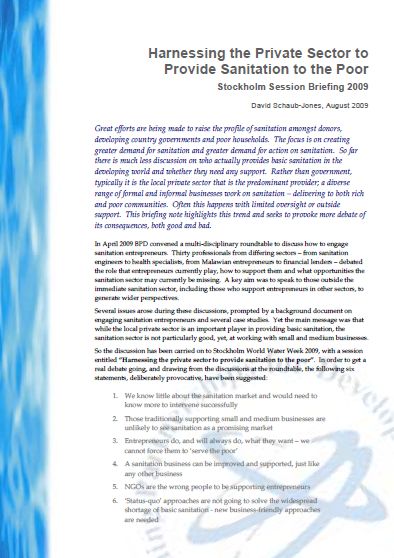
Published in: 2009
Publisher:
Building Partnerships for Development (BPD), UK
Author:
Schaub-Jones, D.
Uploaded by:
SuSanA secretariat
Partner profile:
common upload
3808 Views
14 Downloads
Content - Summary
This briefing note highlights the trend for local private sector operators to provide a primary service and seeks to provoke more debate of its consequences.
Great efforts are being made to raise the profile of sanitation amongst donors, developing country governments and poor households. The focus is on creating greater demand for sanitation and greater demand for action on sanitation. So far there is much less discussion on who actually provides basic sanitation in the developing world and whether they need any support. Rather than government, typically it is the local private sector that is the predominant provider; a diverse range of formal and informal businesses work on sanitation – delivering to both rich and poor communities. Often this happens with limited oversight or outside support. This briefing note highlights this trend and seeks to provoke more debate of its consequences, both good and bad.
In April 2009 BPD convened a multi?disciplinary roundtable to discuss how to engage sanitation entrepreneurs. Thirty professionals from differing sectors – from sanitation engineers to health specialists, from Malawian entrepreneurs to financial lenders – debated the role that entrepreneurs currently play, how to support them and what opportunities the sanitation sector may currently be missing. A key aim was to speak to those outside the immediate sanitation sector, including those who support entrepreneurs in other sectors, to generate wider perspectives.
Several issues arose during these discussions, prompted by a background document on engaging sanitation entrepreneurs and several case studies. Yet the main message was that while the local private sector is an important player in providing basic sanitation, the sanitation sector is not particularly good, yet, at working with small and medium businesses.
So the discussion has been carried on to Stockholm World Water Week 2009, with a session entitled “Harnessing the private sector to provide sanitation to the poor”. In order to get a real debate going, and drawing from the discussions at the roundtable, the following six statements, deliberately provocative, have been suggested:
1. We know little about the sanitation market and would need to know more to intervene successfully
2. Those traditionally supporting small and medium businesses are unlikely to see sanitation as a promising market
3. Entrepreneurs do, and will always do, what they want – we cannot force them to ‘serve the poor’
4. A sanitation business can be improved and supported, just like any other business
5. NGOs are the wrong people to be supporting entrepreneurs
6. ‘Status?quo’ approaches are not going to solve the widespread shortage of basic sanitation ? new business?friendly approaches are needed
Bibliographic information
Schaub-Jones, D. (2009). Harnessing the Private Sector to Provide Sanitation to the Poor. Building Partnerships for Development (BPD), UK
Filter tags
English Faecal sludge treatment processes















